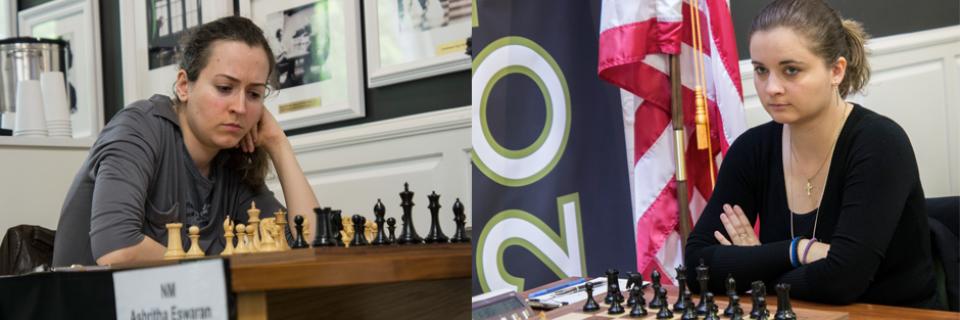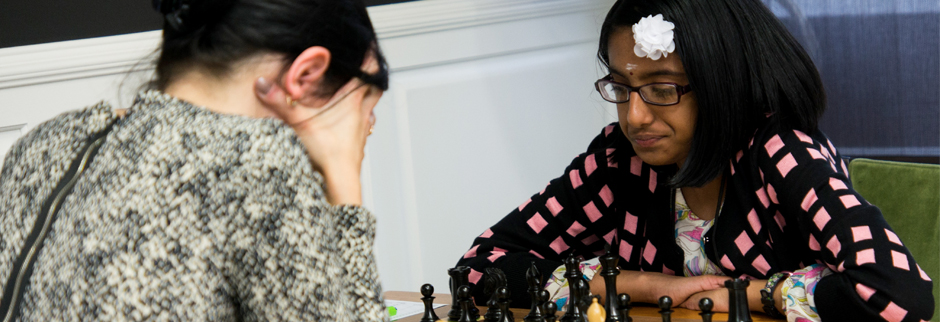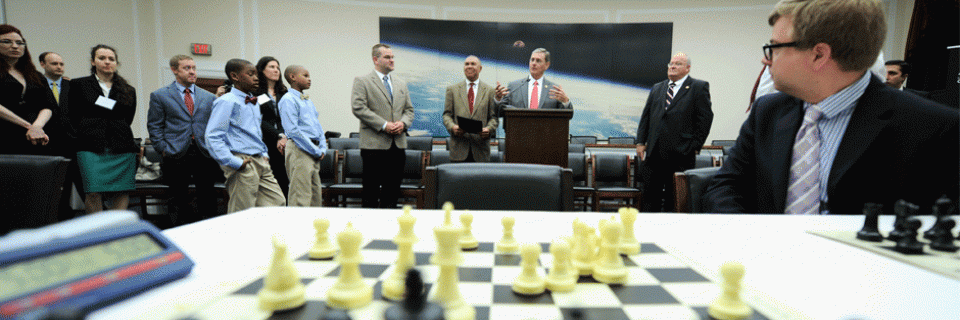2012 U.S. Championships News

Irina Krush and Sabina Foisor each remained perfect after two rounds of play to lead the field. Image Credits: Lennart Ootes.
By Brian Jerauld
SAINT LOUIS (May 9, 2014) -- In the 1964 U.S. Chess Championship, a 20-year-old Bobby Fischer rolled over the nation in jaw-dropping fashion, showcasing his dominance over the field with a perfect 11-0 score. In 2014, that monumental record celebrates its 50th anniversary having never been repeated - though not without a lack of effort by Rex Sinquefield.
Since the annual chase for America’s crown found its new home in the benefactor’s St. Louis castle six years ago, Sinquefield has offered up the incentive $64,000 Fischer Bonus Prize numerous times to any U.S. Championship competitor who can match such convincing command of his challengers. But on Friday’s day two, perhaps a credit to the event’s balanced field, the hopeful chase of Fischer’s feat was brought to a quick end when all six games were drawn.
Sinquefield, however, doesn’t want his money back - and now he’s challenging America’s women to step up.
During Friday’s games, Sinquefield announced that he was extending the carrot to the 2014 U.S. Women’s Championship, and two challengers emerged from the tournament hall to hear the good news. Sabina Foisor stayed perfect after two days following a quality come-from-behind win over Alisa Melekhina, as did reigning Women’s champion Irina Krush, who made quick work of 13-year-old phenom Ashritha Eswaran on Friday afternoon. Krush, in search of a three-peat and her sixth national title, turned in 7-of-9 wins in last year’s event.
The two share the lead, with Anna Zatonskih trailing in clear third with 1.5/2. Zatonskih will defend the black pieces against Foisor in the third round, set to begin today at 1 p.m. CST. Krush defends in the namesake battle versus Iryna Zenyuk.
Ray Robson and Aleksandr Lenderman lead the U.S. Championship with 1.5/2, with the only two wins turned in through two rounds.Today, Robson will attack reigning champion Gata Kamsky with the white pieces, while Lenderman defends against Alejandro Ramirez (1/2).
Lenderman made a quick exit from the Chess Club and Scholastic Center of Saint Louis after pickpocketing Timur Gareev for a half point in the second round. Gareev came out ready to prove himself on Friday, one day removed from the two-seed’s first-round quickdraw with Kamsky, setting up a Nimzo-Indian against Lenderman.
After 7. d5 set up early tension, Gareev’s 18...Bxb4 earned him a pawn up in a cramped position, while Lenderman enjoyed a strong pawn chain through the center and wide-open activity. Gareev held, however, through a tactics-filled middlegame with a paradoxical 25...Kg6 that walked his king into discovered check - correctly.
The writing was on the wall by the 35th move, however, with Gareev’s pieces superior in position and rolling downhill toward pawn promotion. But 52...Rxb3 was a blatant miscalculation in simplification and put him one step behind Lenderman, who played perfectly down the stretch to steal the half point.
“Once it got simple, people like (Gareev) - these geniuses - they relax sometimes,” Lenderman said. “He probably thought ‘OK, I’m winning no matter what and was waiting for me to resign or something. I didn’t even see (Rxb3) as a possibility, and that’s the thing: He finds ideas that other people don’t find. Sometimes they’re good, sometimes they’re bad.”
LENDERMAN-GAREEV annotations by GM BEN FINEGOLD
Kamsky, as the other half of Thursday’s disappointing first-round quick draw, also returned with his quality fighting spirit in a rematch of last year’s playoff for the national title with Alejandro Ramirez.
Ramirez defended with the French and had the queens traded by the 10th move, then passed on his option to castle for some early activity from his king. Kamsky’s 29. Bxg6 kicked off a tactical battle between the rooks and knights on the kingside, though Ramirez’ slight lead went backwards with 36...Nd4. While jamming Kamsky’s king into a tight position, it wasn’t tight enough and ultimately served to win black’s passed d-pawn - though it was an advantage the champion couldn’t convert. A long rook-and-two-pawn endgame proved fruitless.

GM Sam Shankland could not convert a win despite a huge time advantage agaisnt GM Ray Robson.
The Sam Shankland-Rob Robson match turned out to be a defining game for both of the grandmaster’s alter-egos: Mr. Book versus Captain Time Trouble. Perhaps surprised by Shankland’s 1.d4, Robson - notorious for playing on increment, yet bad on Friday even by his own standards - was playing on the 30-second-per-move bonus not halfway to the time control, and Shankland had only 15 minutes gone from his original 90.
But it was Shankland’s personality who got the best of him, completely booked and racing through his lines without finding more to lean on Robson. Just as the black army looked to be suffering, Shankland’s 26. Qa8 looked to stray from the initiative, and Robson easily closed for the half point.
“I made a typical mistake: A big advantage out of the opening in preparation and a huge time advantage,” Shankland said. “But while I was playing my preparation, I just kept blitzing the moves out and didn’t manage to slow down when I really needed to - if I had slowed down and calculated properly, I think we would have seen a different result. I really think I missed out today.”
Foisor took the black pieces against Melekhina and fell behind early, her defense to the advanced French first going astray with 9...Nf5. Her move 20...Bxd6 invited a white pawn deep into her camp - a threat she ignored for 21...hxg4 instead, unsoundly sacrificing her knight and allowing Melekhina a healthy lead. However, it was the seemingly innocuous 27. Qc3 - offering a queen trade and beginning the simplification process - that pushed the pendulum back toward Foisor.
“After (Melekhina) traded queens, I didn’t think I could lose anymore,” Foisor said. “I thought my position was pretty much OK, because my pawn structure was intact and I could just start pushing them. We were both in time trouble, so I thought maybe I had some chances to starting pushing the pawns without enough time for her to calculate.”
Indeed, Foisor’s pawns led a healthy charge in front of her mobilized king, and Melekhina’s advantage bishop was rendered nearly useless: Foisor’s 42...Rf8 left it suffering under both types of pins and at the focus of black’s march of pawns. Melekhina’s 44. Rf5 was a nail in the coffin, ushering liquidation by black with an easy walk to promotion.
Round three of the 2014 U.S. Championship and U.S. Women’s Championship begins today at 1 p.m. CT, 2 p.m. ET. Catch live commentary of the event with GMs Yasser Seirawan, Maurice Ashley and WGM Jennifer Shahade at www.uschesschamps.com/live.

13-year-old Ashritha Eswaran stole the show in round 1 with her victory over Viktorija Ni. Image Credit: Lennart Ootes.
By Brian Jerauld
SAINT LOUIS (May 9, 2014) -- Lights! Camera! Quick-draw??
Eyes rolled on the first day of the 2014 U.S. Championship when the marquee matchup -- a fireworks-filled kickoff between top-seeds Timur Gareev and Gata Kamsky -- finished after 14 moves and only 40 minutes in a draw-by-repetition, starting a trend of half-points through an anti-climactic first round.
But while the men started the day snoozing, the 2014 U.S. Women’s Championship got bruising. The ladies took over opening day’s spotlight with just one well-earned draw and four spirited wins, including 13-year-old Ashritha Eswaran’s show-stealing introduction-by-checkmate as the last act of the day.
Taking an early lead with full points in the first round were Tatev Abrahamyan and Sabina Foisor with the white pieces, as well as reigning champion Irina Krush and Eswaran, in her first-ever U.S. Women’s Championship match, as black. In the U.S. Championship, only Ray Robson and Aleksandr Lenderman earned wins, with all other matches drawing.
Putting an extra shine on Eswaran’s endgame over Viktorija Ni was the youngster being all-but written-off an hour before the 84-move epic concluded. After a back-and-forth pendulum of a game, the 50th move saw Ni with considerable control into the endgame, including a rook to Eswaran’s bishop and a king well-positioned to defend black’s passed pawns.
But Ni’s 56. a4, with intentions to spring her b-pawn toward promotion, was incorrectly calculated and did little more than tie up her major piece in defense against Eswaran’s own a-file passer. Both players could have declared draw-by-repetition by move 70, though the back-and-forth only served to build clock time by way of the 30-second increment. Eventually Eswaran found the winning 70...e5, which created a shield to any checks by the white rook, and released the black bishop from a pin -- threatening a surprise checkmate-in-one after 71...Bc4.
Ni was quickly forced into submission as her rook failed to defend Eswaran’s passed connectors and pesky bishop, ultimately seeing her king smothered in the corner.
“I just try to relax and think about the position,” Eswaran said. “No matter what happens, I just try to do my best.”
NI-ESWARAN Analyzed by GM BEN FINEGOLD
Gareev’s chances to make an early statement in the U.S. Championship flopped, despite his 6. Bg5 in an exchange Slav, which seemed to provoke reigning champion Kamsky into early thought. Kamsky chased the white bishop away with 8...h6 9. Bh4 g5 10. Bg3, then threatened the bishop’s existence with 10...Nh5. It was a bishop pair Gareev refused to concede, leading to a repetition and a quick exit from the first round.
“I don’t have to beat Kamsky to get first place,” Gareev said. “The possibilities I saw were more double-edged, rather than necessarily better for me. I figured instead of gambling, I might as well just take it slow and be better in the next round.”
A small victory, perhaps, for Kamsky in the earlygoing.
“I consider it like football: you have to know where to save energy, and you have to know where to spend it and go for a win,” Kamsky said. “The way I played it, I forced him to make a decision right there on the spot whether he wanted to spend time and energy to win this game. He has to make this decision early on, without being able to see the final result or the position that may arise later.”
Also drawing were Varuzhan Akobian-Daniel Naroditsky and Alejandro Ramirez-Sam Shankland in rook-and-pawn endgames, as well as Mackenzie Molner-Alexander Onischuck -- though not without a lack of effort by the 2014 U.S. Championship wildcard.
Molner played a novelty 10. Nd3 in a Queen’s Indian, offering the c4 pawn in exchange for some healthy compensation in activity. But Onischuck’s nifty 16...Nc5 took advantage of a pin on Molner’s d-pawn, allowing the piece to remobilize and easily deal with white’s expedited queenside attack.
“I tried to play a little bit ambitiously by sacrificing the pawn, but it didn’t seem like I ever got more than enough to just keep the balance, never an advantage, it seemed,” Molner said. “(Onischuck) played some good defensive moves, like Nc5. I didn’t realize he was going to bring his knight around to a6; that was a good idea.”
The best game play from the men came from the hand of Ray Robson, who convincingly dismantled Sergey Erenberg's Petrov’s Defense for the full point. The game turned interesting after both sides castled queenside, with Robson creating better lanes and coordination of pieces through the middlegame. The move 25. g6 is when he cashed in his lead, a pawn sacrifice that allowed his rook to the seventh file and a fast track to Erenberg’s king.
“A critical moment was g6, and I think it was a pretty good sacrifice - he just can’t get rid of my rook on the seventh,” Robson said. “I’m going to put one rook on it, and eventually another rook, and he’s going to have big problems. I was a little worried that he might try to play something like Rg1 - he’d still be worse, but he could try to exchange one pair of rooks. I wanted to keep both of my rooks on the board, because eventually the other one is going to come to the seventh as well. He probably still had some chances to defend, but it was very difficult, especially with low time.”
U.S. Open winner Josh Friedel looked comfortable 16 moves into his English opening with Lenderman, enjoying better development and strong central control as part of a decent initiative. But Friedel’s slow-paced plans eventually stalled at 39. a5, allowing Lenderman to grab the momentum. The white army instantly crumbled from the center.
“It was a shifting of the mindset,” Lenderman said. “He was looking for defensive moves, all of a sudden, which could be a little bit tough - especially with lower time. I really thought I might lose this game, after getting outplayed, behind on time and in a position where I was not very comfortable - but I guess I was fortunate.”
Katerina Nemcova came out swinging for her first fight in the U.S. Women’s Championship, after recently switching federations from the Czech Republic, but ultimately succumbed to the five-time reigning U.S. women’s champion Krush. Though Nemcova was already down 35 minutes to Krush’s five after 12 moves, the game was shaping up to be a lively classic Sicilian.
Nemcova’s seemingly harmless 19. Nc3, removing her knight from the rim, was responded by Krush’s surprise 19...a5 and dubious follow-up 20...Qb8 to exchange her bishop for a rook three moves later. Two moves later, Nemcova was playing on the 30-second increment.
But she did not go quietly. Quick moves, and a pesky knight and queen, continued a proper harassment of Krush’s exposed king and gave fits to black’s endgame, despite featuring connected, passed pawns. The game continued through the 57th move before Krush finally broke through.
For a complete listing of the standings and round 2 pairings, visit http://www.uschesschamps.com/node/429.
Tune into live play-by-play of round 2 today at 1 p.m. CT, 2 p.m. ET with GMs Yasser Seirawan and Maurice ashley and WGM Jennifer Shahade at www.uschesschamps.com/live.

GM Irina Krush, the reigning U.S. Women's Champion, is interviewed by a local news crew.
By Brian Jerauld
Grandmasters Gata Kamsky and Irina Krush: Please return your crowns.
Time expired on both champions’ reign over the nation Wednesday night in St. Louis, with the opening ceremonies of the 2014 U.S. Championship and U.S. Women’s Championship ringing the bell for a new round of challengers to the national title.
To earn his crown back - and the lion’s share of $172,000 in prizes - Kamsky will need to beat out 11 of America’s top grandmasters, including U.S. Open winner Josh Friedel and wildcard Mackenzie Molner; while Krush will be up against nine of the nation’s best females, including 13-year-old Ashritha Eswaran, for the U.S Women’s Championship. Rounds begin daily at 1 p.m. local time through May 20, with full coverage of the event on www.uschesschamps.com.
Wednesday’s opening ceremonies were held at the World Chess Hall of Fame, which sits directly across the street from the venue for the tournaments, the Chess Club and Scholastic Center of Saint Louis. The event featured the drawing of lots to determine pairings and colors for both round-robin tournaments. Here are the pairings for Wednesday’s first round, highlighted by an instant clash between top-seeded Kamsky and two-seed Timur Gareev.
In the U.S. Women’s Championship, the reigning champion Krush takes on WGM Katerina Nemcova, a University of Texas - Brownsville student who is a newcomer to the U.S. Women’s Championship.
The 2014 opening ceremonies also featured the induction of two new selections into the U.S. Chess Hall of Fame, as well as two selections into the World Chess Hall of Fame, which are both housed in the same building. The U.S. Chess Trust added Abraham Kupchik, the 13-time winner of the Manhattan Chess Club Championship; as well as Jacqueline Piatigorsky, initiator of the U.S. Junior Closed Championships and organizer of two of the strongest American tournaments in history, the Piatigorsky Cups.
Added to the World hall was Maya Chiburdanidze, women’s world chess champion from 1978-1991 and only the second woman to earn the grandmaster title. Also honored was Paul Keres, the “crown prince of chess” who was seven times a World Championship candidate, yet never a winner.
The ceremonies also received remarks from International Arbiter Carol Jarecki, CCSCSL Executive Director Tony Rich, Jeff Rainford (Chief of Staff to St. Louis Mayor Francis Slay), as well as U.S. Championship sponsors Rex and Jeanne Sinquefield. Much attention and applause was spent on St. Louis’ recent designation by Congress as the U.S. capital of chess.
The 2014 U.S. Championship will offer a $64,000 “Fischer prize” to any player in the U.S. Championship who runs the table with all victories. The prize honors the 50th anniversary of the American legend accomplishing such a feat with a 11-0 score in the 1963-64 U.S. Championship. It has never been repeated.
Both tournaments begin Thursday afternoon at 1 p.m., with every move broadcast live and discussed by the powerful commentary team of GMs Yasser Seirawan, Maurice Ashley and WGM Jennifer Shahade on www.uschesschamps.com.
Local viewers may enjoy live commentary by GMs Ben Finegold and Robert Hess. Entry to the event is free for annual members of the Chess Club but costs just $10 per day for non-members.

A resolution recognizing Saint Louis as the "National Chess Capital" was introduced on the floor of the Senate in April.
SAINT LOUIS, May 6, 2014 – On the eve of hosting the most prestigious chess tournaments in the nation, St. Louis received national recognition from the United States Senate, which passed an official resolution late Monday night naming St. Louis the National Chess Capital.
The resolution, which was introduced by Senators Claire McCaskill (D-MO) and Roy Blunt (R-MO), also seeks to raise awareness of the educational benefits of chess and to encourage schools and community centers to engage in chess programs that promote important developmental skills like problem-solving, critical thinking, spatial awareness and more.
"The Chess Club and Scholastic Center of Saint Louis hosts all major U.S. chess competitions and has been a driver in educating children throughout the State since its inception," Senator McCaskill said. "The intellect and creativity needed to learn and compete in chess also helps students think creatively and strategically in traditional academic areas, including math and science. We are proud St. Louis is leading the way in competitive American chess while providing students the problem-solving and critical thinking skills needed in an ever-advancing world."
“I’m pleased the Senate approved our resolution to designate St. Louis as the National Chess Capital,” Senator Blunt said. “Chess programs like those offered by the Chess Club and Scholastic Center of Saint Louis challenge young people academically and help motivate them to succeed."
The news comes just days after the announcement that a Congressional Chess Caucus has been formed to promote the educational benefits of chess and just days before the top chess players in the country will compete in St. Louis for the title of U.S. Champion and U.S. Women’s Champion.
The 2014 U.S. Championship and 2014 U.S. Women’s Championship will begin May 7 and continue through May 20 at the Chess Club and Scholastic Center of Saint Louis (CCSCSL).
This marks the sixth consecutive year that each of these prestigious events will be held in St. Louis. The opening ceremony takes place At the World Chess Hall of Fame on May 7 at 6 p.m., and the first round for both events will kick off at 1 p.m. on May 8.
The 2014 U.S. Championship will feature a 12-player round robin and a guaranteed total prize fund of $172,000. The winner will take home $45,000.
In addition, the CCSCSL is sponsoring a “$64,000 Fischer Prize,” to be awarded to anyone who wins all 11 of their games outright without a single draw or defeat. The prize is named in honor of the 50th anniversary of Bobby Fischer’s accomplishment of that feat -- the only time anyone has ever done it -- at the 1963-64 U.S. Championship.
Last year, Grandmaster Gata Kamsky of New York City won his fourth U.S. Championship title. Kamsky, 39, seeks to defend his title this year against 11 strong competitors.
The 2014 U.S. Women’s Championship will feature 10 players and a guaranteed prize fund of $72,000. Grandmaster Irina Krush, 30, of New York City looks to defend her U.S. Women’s Championship crown.
Tony Rich, executive director of the CCSCSL, said these tournaments provide a learning opportunity for spectators and create role models for students of the game.
“Chess offers developing students a wide array of benefits including critical thinking, planning and sportsmanship, just to name a few,” Rich said. “Hosting these events allows us to showcase the top players in the country and also tell the world about the fantastic educational benefits chess can offer.”
Annual members of the Chess Club can attend the event for free, and annual membership to the CCSCSL costs just $50 for students or $100 for adults. Tickets for individual rounds of the event are available for $10 per day.
In addition, the CCSCSL is hosting a free student weekend May 17 and May 18, which will waive the $10 ticket price for all K-12 students.
For more information on the players and the U.S. Championships, visit www.uschesschamps.com.
WGM Jennifer Shahade and GM Yasser Seirawan will join GM Maurice Ashley (not pictured) to provide live commentary for the 2014 U.S. Championships.
SAINT LOUIS, April 14, 2014 -- Next month, the top chess players in the country will meet in Saint Louis to compete for the tile of U.S. Champion and U.S. Women’s Champion.
The fields are set for both the 2014 U.S. Championship and 2014 U.S. Women’s Championship, scheduled to be held simultaneously May 7 through May 20 at the Chess Club and Scholastic Center of Saint Louis (CCSCSL).
Ashritha Eswaran, 13, received the final wildcard invitation to the U.S. Women’s Championship to round out the fields.
This marks the sixth consecutive year that each of these prestigious events will be held in Saint Louis. The opening ceremony takes place on May 7, and the first round for both events will kick off at 1 p.m. Central on May 8.
The 2014 U.S. Championship will feature a 12-player round robin and a guaranteed prize fund of $172,000. In addition, the CCSCSL again will sponsor the “$64K Fischer Prize,” to be awarded to anyone that scores a perfect 11-0 in the U.S. Championship, in honor of Bobby Fischer’s result at the 1963-64 U.S. Championship.
GM Hikaru Nakamura declined his invitation to play in this year’s event, citing his desire to prepare for and compete against the world’s elite as he prepares for a run at the next Candidate’s cycle.
Tony Rich, executive director of the CCSCSL, said the competition will be fierce.
“Any one of these players has a shot at the title this year,” Rich said.
The complete list of players, and their current USCF ratings, for the 2014 U.S. Championship is as follows:
- GM Gata Kamsky (2778)
- GM Timur Gareev (2751)
- GM Alex Onischuk (2751)
- GM Varuzhan Akobian (2732)
- GM Sergey Erenburg (2717)
- GM Ray Robson (2714)
- GM Sam Shankland (2698)
- GM Alex Lenderman (2693)
- GM Alejandro Ramirez (2679)
- GM Mac Molner (2634)
- GM Daniel Naroditsky (2632)
- GM Josh Friedel (2599)
The 2014 U.S. Women’s Championship will feature 10 players and a guaranteed prize fund of $72,000. GM Irina Krush looks to defend her U.S. Women’s Championship crown. The field for the 2014 U.S. Women’s Championship is as follows:
- GM Irina Krush (2548)
- IM Anna Zatonskih (2526)
- WGM Tatev Abrahamyan (2475)
- WGM Camilla Baginskaite (2358)
- WIM Iryna Zenyuk (2352)
- WGM Sabina Foisor (2303)
- WIM Viktorija Ni (2302)
- WGM Katerina Nemcova (2297)
- FM Alisa Melekhina (2251)
- NM Ashritha Eswaran (2231)
“The U.S. Women’s Championship features seasoned veterans along with some exciting new faces as well,” Rich said. “I’m excited the Chess Club gets to showcase so many inspiring role models for Saint Louis area students.”
The well-established commentary team of GM Maurice Ashley, GM Yasser Seirawan and WGM Jennifer Shahade will once again offer Internet viewers live play-by-play and analysis for each round of the event. GM Robert Hess will join GM Ben Finegold to provide commentary for the live audience in Saint Louis.
Carol Jarecki will serve as the chief arbiter for both events.
Check this website the latest updates, full player bios, info about past U.S. Championships and news about the top players in the U.S.

GM Gata Kamsky and GM Irina Krush each will look to defend his and her respective titles at the 2014 U.S. Championships in Saint Louis.
Note: The Closing Ceremony of the U.S. Championships is May 20. The initial draft of this press release listed May 21 as the final day. The U.S. Junior Championship will take place June 19-29.
SAINT LOUIS (January 15, 2014) -- The best chess players in the U.S. will gather in Saint Louis once again to fight for the title of U.S. Champion and U.S. Women’s Champion.
For the sixth consecutive year Saint Louis will host the top chess tournaments in the nation.
GM Gata Kamsky will defend his title at the 2014 U.S. Championship while recently anointed Grandmaster Irina Krush will look for her sixth title at the 2014 U.S. Women’s Championship. The events will be held simultaneously May 7 through May 20 at the Chess Club and Scholastic Center of Saint Louis (CCSCSL).
The U.S. Junior Closed Championship also will be held in Saint Louis once again from June 20 through July 3. This marks the fifth consecutive year the CCSCSL has hosted the top event in the nation for players under the age of 20.
Tony Rich, executive director of the CCSCSL, said he is excited to continue the long-standing and growing tradition of U.S. Championship chess in Saint Louis.
“Since 2009, we’ve worked to raise the prominence and profile of the U.S. Championships,” Rich said. ”We’re honored the U.S. Chess Federation once again awarded these prestigious events to Saint Louis, and we hope our U.S. Champions will continue to serve as role models for young chess players across the country.”
These three events are the most prominent invitational tournaments in the nation, and the players will be competing for more than a quarter of a million dollars in prize money.
2014 U.S. Championship
- Dates: May 7-20, 2014
- Format: 12-player Round Robin
- Prize Fund: $172,000 plus $64k Fischer Bonus (breakdown to be published soon)
- Invitations:
- 2013 U.S. Champion: Gata Kamsky
- 2013 U.S. Junior Closed Champion: Daniel Naroditsky
- 2013 U.S. Open Champion: Josh Friedel
- (1) - Wildcard (TBD)
- (8) - Rating (TBD - March supplement)
2014 U.S. Women's Championship
- Dates: May 7-20, 2014
- Format: 10-player Round Robin
- Prize Fund: $72,000 (breakdown to be published soon)
- Invitations:
- 2013 U.S. Women's Champion: Irina Krush
- (2) - Wildcard (TBD)
- (7) - Rating (TBD - March supplement)
2014 U.S. Junior Closed Championship
- Dates: June 19-29, 2014
- Format: 10-player Round Robin
- Prize Fund: $10,000 (breakdown to be announced soon)
- Invitations:
- (1) - 2013 U.S. Junior Closed Champion (Daniel Naroditsky)
- (1) - 2013 U.S. Junior Open Champion (Justus Williams)
- (2) - Wildcard (TBD)
- (6) - Rating (TBD - April rating supplement)
For the U.S. Championship, the CCSCSL once again will sponsor the “$64K Fischer Prize,” to be awarded to anyone that scores a perfect 11-0, in honor of Bobby Fischer’s similar accomplishment at the 1963-64 U.S. Championship.
Stay tuned for the latest updates about the U.S. Championships.

